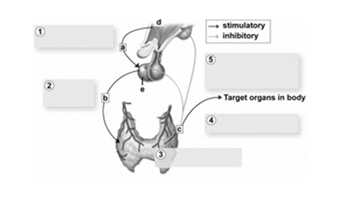A) increase,increase
B) increase,decrease
C) decrease,decrease
D) decrease,increase
Correct Answer

verified
Correct Answer
verified
True/False
Parathyroid hormone functions to raise blood calcium levels.
Correct Answer

verified
Correct Answer
verified
True/False
Like all other hormone transport proteins,albumin is highly specific in terms of which hormone it carries through the blood.
Correct Answer

verified
Correct Answer
verified
True/False
Growth hormone releasing hormone (GHRH)is one of the regulatory hormones released by the hypothalamus that acts on the pituitary.
Correct Answer

verified
Correct Answer
verified
True/False
All hormone secretion is under the direct control of the hypothalamus.
Correct Answer

verified
False
Correct Answer
verified
Multiple Choice
Which hormone is secreted by the pineal gland
A) Melatonin
B) Insulin
C) Melanin
D) Cortisol
E) Oxytocin
Correct Answer

verified
Correct Answer
verified
Multiple Choice
Thyroid hormone's effects are to
A) increase metabolic rate and body temperature by increasing protein synthesis in target cells.
B) increase metabolic rate and body temperature by turning on the G protein,cAMP cascade.
C) decrease metabolic rate and body temperature by increasing protein synthesis in target cells.
D) decrease metabolic rate and body temperature by turning on the G protein,cAMP cascade.
E) increase metabolic rate and body temperature by turning off the G protein,cAMP cascade.
Correct Answer

verified
Correct Answer
verified
Multiple Choice
Which hormone is secreted by the beta cells of the pancreas
A) Insulin
B) Glucagon
C) Somatostatin
D) Pancreatic polypeptide
E) Pancreatic lipase
Correct Answer

verified
Correct Answer
verified
Multiple Choice
Excessive secretion of growth hormone in adults can cause
A) Graves disease.
B) acromegaly.
C) pituitary gigantism.
D) pituitary dwarfism.
E) Cushing syndrome.
Correct Answer

verified
Correct Answer
verified
True/False
The thymus gland secretes erythropoietin in response to low blood oxygen.The kidneys secrete erythropoietin in response to low blood oxygen.
Correct Answer

verified
Correct Answer
verified
Multiple Choice
In addition to secreting hormones,the pancreas also produces
A) white blood cells.
B) sodium chloride.
C) pancreatic juice.
D) endorphins.
E) prostaglandins.
Correct Answer

verified
Correct Answer
verified
Multiple Choice
The hypothalamic hormone that triggers the release of adrenocorticotropic hormone (ACTH) is
A) cortisol.
B) corticotropin-releasing hormone (CRH) .
C) vasopressin.
D) adrenal follicle-stimulating hormone.
E) cortical stimulating factor (CSF) .
Correct Answer

verified
B
Correct Answer
verified
Multiple Choice
The hormone that increases the rate of glycogen breakdown and glucose release by the liver is
A) insulin.
B) glucagon.
C) glucocorticoid.
D) somatostatin.
E) epinephrine.
Correct Answer

verified
Correct Answer
verified
Multiple Choice
Thyrotropin-releasing hormone is secreted by the
A) hypothalamus and it increases release of thyroid-stimulating hormone from the anterior pituitary.
B) hypothalamus and it increases release of thyroid-stimulating hormone from the posterior pituitary.
C) anterior pituitary and it increases release of thyroid hormone from the thyroid gland.
D) parathyroid hormone and it increases release of thyroid hormone from the thyroid gland.
E) thymus and it increases release of thyroid hormone from the thyroid gland.
Correct Answer

verified
A
Correct Answer
verified
Multiple Choice
The disease called ___________ is caused by excessive secretion of glucocorticoids,and is characterized by redistribution of body fat to produce characteristic features such as "moon face."
A) Cushing syndrome
B) Addison disease
C) androgenital syndrome
D) pheochromocytoma
E) Graves disease
Correct Answer

verified
Correct Answer
verified
Multiple Choice
Which is not a tropic hormone
A) Thyroid-stimulating hormone
B) Adrenocorticotropic hormone
C) Follicle-stimulating hormone
D) Prolactin
Correct Answer

verified
Correct Answer
verified
Multiple Choice
Which type of hormone requires a carrier protein in the blood
A) Autocrine hormone
B) Water-soluble hormone
C) Oligopeptide
D) Lipid-soluble hormone
Correct Answer

verified
Correct Answer
verified
Multiple Choice
 -This figure shows an example of regulation of hormone secretion by a negative feedback loop.The large box labeled 1 represents the initial stimulus.What hormones are represented by the small boxes labeled a,b,and c
-This figure shows an example of regulation of hormone secretion by a negative feedback loop.The large box labeled 1 represents the initial stimulus.What hormones are represented by the small boxes labeled a,b,and c
A) a = TSH,b = TRH,c = TH
B) a = TIH,b = TSH,c = TH
C) a = TRH,b = TSH,c = TIH
D) a = TRH,b = TSH,c = TH
E) a = TSH,b = TH,c = TRH
Correct Answer

verified
Correct Answer
verified
Multiple Choice
Thyroid hormone synthesis involves secretion of a glycoprotein called ___________ by the follicular cells.
A) colloid
B) thyroxine
C) triiodothyronine
D) thyroglobulin
E) tetraiodothyronine
Correct Answer

verified
Correct Answer
verified
Multiple Choice
The adrenal glands are located ________ to the parietal peritoneum and each has a cortex of a ________ color.
A) anterior,brown
B) anterior,yellow
C) posterior,brown
D) posterior,yellow
Correct Answer

verified
Correct Answer
verified
Showing 1 - 20 of 121
Related Exams